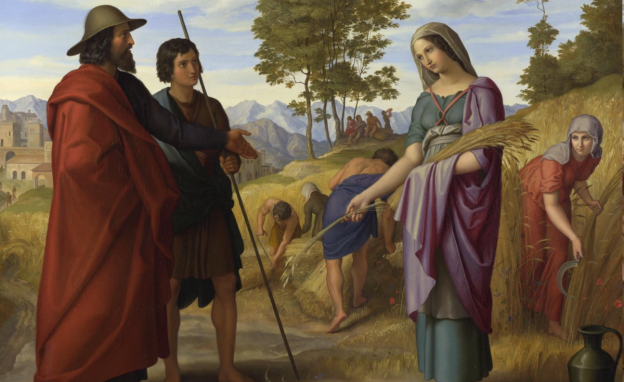When bad things happen, there are three ways as professing Christians we can react. Firstly, we can abandon the faith and go to some form of paganism. Secondly, we can become embittered and angry towards God. Thirdly, we can cling to God and trust in him to provide, even come what may.
All three responses to ruin appear in Ruth 1. Naomi embraces bitterness, Orpah embraces her old gods, and Ruth embraces Naomi and Naomi’s God, despite her position as an outsider in Israel. This passage calls us to embrace Ruth’s approach, and reminds us that even though we might have a Naomi-like approach when things go wrong, God is still working in Christ for our good; one day, by faith, we may realise it.
With Naomi’s husband and sons dead, and nobody to care for her or her two daughters-in-law, Naomi was in a desperate situation. But word reached Moab that God had blessed Israel again with plenty, so Naomi resolved to head home and rely on the charity of her relatives (vv.6-7).
As she left, Naomi encouraged her two daughters-in-law to return to their own families where she prayed they would find husbands to support them (vv.8-9). Clearly their shared grief and loss bound them together, because they wept together, and both daughters initially claimed a desire to return with Naomi to Bethlehem (vv.9-10).
However, Naomi insisted otherwise. She had no sons to give them, and even if she remarried and bore sons, they would have to wait many years for them to come of age (vv.11-13). As far as Naomi was concerned, God had acted in judgement against her (v.13).
Orpah listened to her mother-in-law’s advice, weighed up the pros of staying in the land she knew with its green fields and family connections versus the cons, and returned home to her family and her pagan gods (v.14). From there, she passed out of history. She may have remarried, and had children. But she did not have a saving relationship with God.
Ruth clung to Naomi, like a husband should cling to his wife (Gen 2:24), and refused to leave her. Ruth’s commitment to Naomi was a covenant commitment. A wholehearted commitment. She refused to follow Orpah back to her family and their gods (cf. v.15).
Instead, Ruth proclaimed that “where you go I will go, and where you lodge I will lodge. Your people shall be my people, and your God my God. Where you die I will die, and there will I be buried. May the Lord do so to me and more also if anything but death parts me from you” (vv.16-17).
Ruth knew that leaving her homeland for one that was suspicious of outsiders, much less Moabites, was risky. But she was willing to because she believed that Naomi’s God would provide. Naomi’s God was her God, too.
At this Naomi stopped trying to convince Ruth (v.18). But Naomi was not exactly pleased or blessed by this expression of devotion to her and faith in God. Because while Naomi was returning home, it was not with a contrite heart.
When they reached Bethlehem and Naomi was recognised and the town was stirred by her arrival and that of a foreigner with her (likely with suspicious eyes at the latter). But Naomi’s response to recognition was not gladness but bitterness, reflected in her request they call her Mara (which means “bitter”, vv.19-20).
Naomi’s heart was bitter and angry towards God. While she had returned to her home, it was not out of covenant loyalty but practicality. Here, she could survive on charity. But she did not presume God would bless her again.
Despite her feelings, God was not done with Naomi. They had returned to Bethlehem, and the barley harvest approached (v.22).
Here in this passage are three responses to ruin. Apostasy, anger, and appropriation. The first two lead nowhere, but appropriating God’s goodness through faith leads to life.
God would one day bless bitter Naomi, through faithful Ruth. Outsider to God’s covenant promises, yet who acquired them by faith. Ruth emptied herself of her family and cultural connections and her culture’s pagan deities to identify herself with God’s People, with Naomi, and with Naomi’s God who she believed could provide a future for her. As it happened with Ruth then, it does and will happen today.
Like Ruth, we appropriate salvation through identifying ourselves with Christ, the author and finisher of our faith. By trusting in God, we become part of God’s covenant people, the only place where salvation is found.
All of us at one point in life face this moment of choice – will we choose apostasy, anger, or appropriate Christ when bad times come? Will we love those who are bitter towards God, sacrificing ourselves that they too may find joy in appropriating Christ in their own lives?
God was still working in Naomi’s life. By God’s grace, through the Gospel, he is still working in our lives too. If you are more Mara than Ruth, hang in there.


